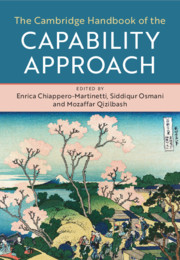Book contents
- The Cambridge Handbook of the Capability Approach
- The Cambridge Handbook of the Capability Approach
- Copyright page
- Dedication
- Contents
- Figures
- Tables
- Contributors
- Foreword
- Acknowledgements
- General Introduction
- Part I Historical Antecedents and Philosophical Debates
- Part II Methods, Measurement and Empirical Evidence
- Part III Issues in Public Policy
- Introduction to Part III
- 25 On Education and Capabilities Expansion
- 26 Capability Approach to Children’s Well-Being and Well-Becoming
- 27 Capability and Disability
- 28 Social Exclusion and Capability Development
- 29 Human Security
- 30 Income Inequality and Human Capabilities
- 31 The Capability Approach and Human Rights
- 32 Capabilities and the Law
- 33 Capabilities, Public Reason and Democratic Deliberation
- 34 Entitlements and Capabilities
- 35 Religion and the Capability Approach
- Index
- References
35 - Religion and the Capability Approach
from Part III - Issues in Public Policy
Published online by Cambridge University Press: 11 November 2020
- The Cambridge Handbook of the Capability Approach
- The Cambridge Handbook of the Capability Approach
- Copyright page
- Dedication
- Contents
- Figures
- Tables
- Contributors
- Foreword
- Acknowledgements
- General Introduction
- Part I Historical Antecedents and Philosophical Debates
- Part II Methods, Measurement and Empirical Evidence
- Part III Issues in Public Policy
- Introduction to Part III
- 25 On Education and Capabilities Expansion
- 26 Capability Approach to Children’s Well-Being and Well-Becoming
- 27 Capability and Disability
- 28 Social Exclusion and Capability Development
- 29 Human Security
- 30 Income Inequality and Human Capabilities
- 31 The Capability Approach and Human Rights
- 32 Capabilities and the Law
- 33 Capabilities, Public Reason and Democratic Deliberation
- 34 Entitlements and Capabilities
- 35 Religion and the Capability Approach
- Index
- References
Summary
After reviewing how Sen’s and Nussbaum’s works have incorporated religion in the capability approach through religious narratives and teachings, the chapter furthers this engagement by exploring the contribution of specific religious narratives and teachings to public reasoning and capability expansion. It does so in reference to the Catholic tradition and the global socio-ecological crisis. The chapter is divided into three sections. The first section overviews how religion has been addressed in the capability approach literature. Religion, or relation with a higher source of being, has been considered a relevant dimension of well-being, an important source of agency, and an influence in the formation of people’s values. The second section introduces the relational anthropological dimension of the capability approach. It discusses how the Christian narrative of the parable of The Sower can enhance the universal reach of the capability approach and expand its notion of relationships. The third section highlights the connection between individual choices and social structures, as well as the need for motivational attitudes for transforming and removing injustices. It does so through the religious contribution of the latest social teaching of the Catholic tradition, the papal encyclical Laudato Si’: On the Care of our Common Home.
Keywords
Information
- Type
- Chapter
- Information
- The Cambridge Handbook of the Capability Approach , pp. 686 - 705Publisher: Cambridge University PressPrint publication year: 2020
